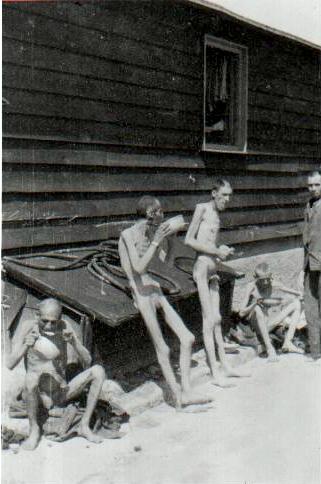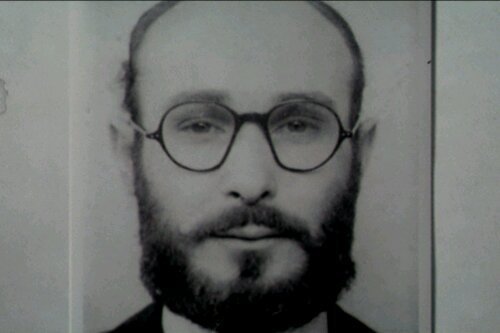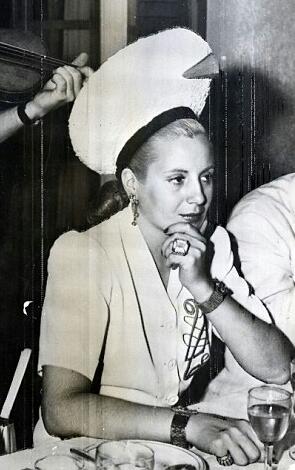My grandparents were wed in a Catholic church in Warsaw in the Spring of 1940.
On the way from the church they got caught up in one of those frequent
round-ups [1]: German soldiers surrounded an entire city block and scooped up everybody inside it, indiscriminately. In the havoc of the round up, the wedding party got separated and spread out. My grandmother and some others managed to get away, but my grandfather was caught along with some guests and a whole lot of other people.
Instead of going on a honeymoon, the next several months grandpa spent at the
Gestapo (secret police) interrogation prison (
Aleja Szucha - where such interrogation techniques as severe beating and pulling fingernails were used), then the
political prison [2], and finally was sent off to
Auschwitz [3]. He spent the next 5 years of WWII in
concentration camps. He survived Auschwitz, as he himself said - because his friend from high school was a
kapo [4] in the camp, and offered my grandpa the occasional slice of bread, a potato, a blanket, and then some dilapidated shoes for the
death march [5] to another concentration camp in
Mauthausen-Gusen [6], in Austria. That long walk happened in the middle of a bitter winter, with many prisoners shoeless... Mauthausen, as grandpa often said, was worse than Auschwitz. It was not just a death camp, it was a labour camp with one goal: death through slave labour.
Mauthausen prisoners shortly after liberation:

.

Explanations from WikiPedia:
[1] Łapanka - round up (wapanka - catching, derived from the verb łapać - to catch) was the Polish name for a German practice in World War II occupied Poland, whereby the SS, Wehrmacht and Gestapo rounded up civilians on the streets of Polish cities.
Most of these prisoners were taken to labour camps (Arbeitslager) in Germany. Some, particularly those without proper documents or carrying contraband, were transported to concentration and death camps; sometimes shot on the spot. Some women ended up in brothels to "service" German troops. The term was also used for the cordoning off of streets at night and the systematic searching of houses. Possession of an identity card (Ausweis) certifying that the holder was employed by a German company or government agency (for example the city utilities or the railways) was the only reliable defense for young men in their 20s and 30s against being taken. As an example many of those taken from cafes and restaurants in Warsaw on 5 December 1940, were subsequently released after checking documentation. According to various estimates, between 1942 and 1944 there were approximately 400 victims of this practice daily in Warsaw alone, with numbers on some days reaching several thousand. For example, on 19 September 1942 close to 3000 men and women were transported by train to Germany, they had been caught in the massive round-ups all over Warsaw the previous two days.
[2] Pawiak was an infamous
political prison built in 1835 in Warsaw, Poland. During the World War II German occupation of Poland, it eventually became part of the Warsaw concentration camp. Following the German invasion of Poland in 1939 it was turned into a German Gestapo prison and then part of the Warsaw concentration camp. Approximately 100,000 men and 20,000 women passed through the prison, mostly members of the Armia Krajowa, political prisoners and civilians taken as hostages in street round-ups. Approximately 37,000 of them were executed while further 60,000 were sent to German death and concentration camps. The exact number of victims is unknown since the archives were never found.
 [3] Auschwitz-Birkenau
[3] Auschwitz-Birkenau (Konzentrationslager Auschwitz) was the largest of Nazi Germany's
concentration camps. Its remains are located in Poland approximately 50 kilometers west of Kraków and 286 kilometers south of Warsaw. The camp took its name from the nearby town of Oświęcim. Birkenau, the German translation of Brzezinka, refers to the many birch trees surrounding the complex. Following the German invasion of Poland in September 1939, Oświęcim was annexed by Nazi Germany and renamed Auschwitz, the town's German name.
[4] Kapo was a term used for certain prisoners who worked inside Nazi
concentration camps during World War II in various lower administrative positions.
[5] The
death marches refer to the forcible movement between Autumn 1944 and late April 1945 by Nazi Germany of thousands of prisoners from German
concentration camps near the war front to camps inside Germany.
[6] Mauthausen Concentration Camp (known from the summer of 1940 as Mauthausen-Gusen Concentration Camp) grew to become a large group of Nazi
concentration camps that were built around the villages of Mauthausen and Gusen in Upper Austria, roughly 20 kilometres (12 mi) east of the city of Linz.
Initially a single camp at Mauthausen, it expanded over time to become one of the largest labour camp complexes in German-controlled Europe. Apart from the four main sub-camps at Mauthausen and nearby Gusen, more than 50 sub-camps, located throughout Austria and southern Germany, used the inmates as slave labour. Several subordinate camps of the KZ Mauthausen complex included quarries, munitions factories, mines, arms factories and Me 262 fighter-plane assembly plants.
In January 1945, the camps, directed from the central office in Mauthausen, contained roughly 85,000 inmates. The death toll remains unknown, although most sources place it between 122,766 and 320,000 for the entire complex. The camps formed one of the first massive concentration camp complexes in Nazi Germany, and were the last ones to be liberated by the Western Allies or the Soviet Union. The two main camps, Mauthausen and Gusen I, were also the only two camps in the whole of Europe to be labelled as "Grade III" camps, which meant that they were intended to be the toughest camps for the "Incorrigible Political Enemies of the Reich". Unlike many other
concentration camps, intended for all categories of prisoners, Mauthausen was mostly used for extermination through labour of the intelligentsia, who were educated people and members of the higher social classes in countries subjugated by Germany during World War II.





 [3] Auschwitz-Birkenau (Konzentrationslager Auschwitz) was the largest of Nazi Germany's
[3] Auschwitz-Birkenau (Konzentrationslager Auschwitz) was the largest of Nazi Germany's